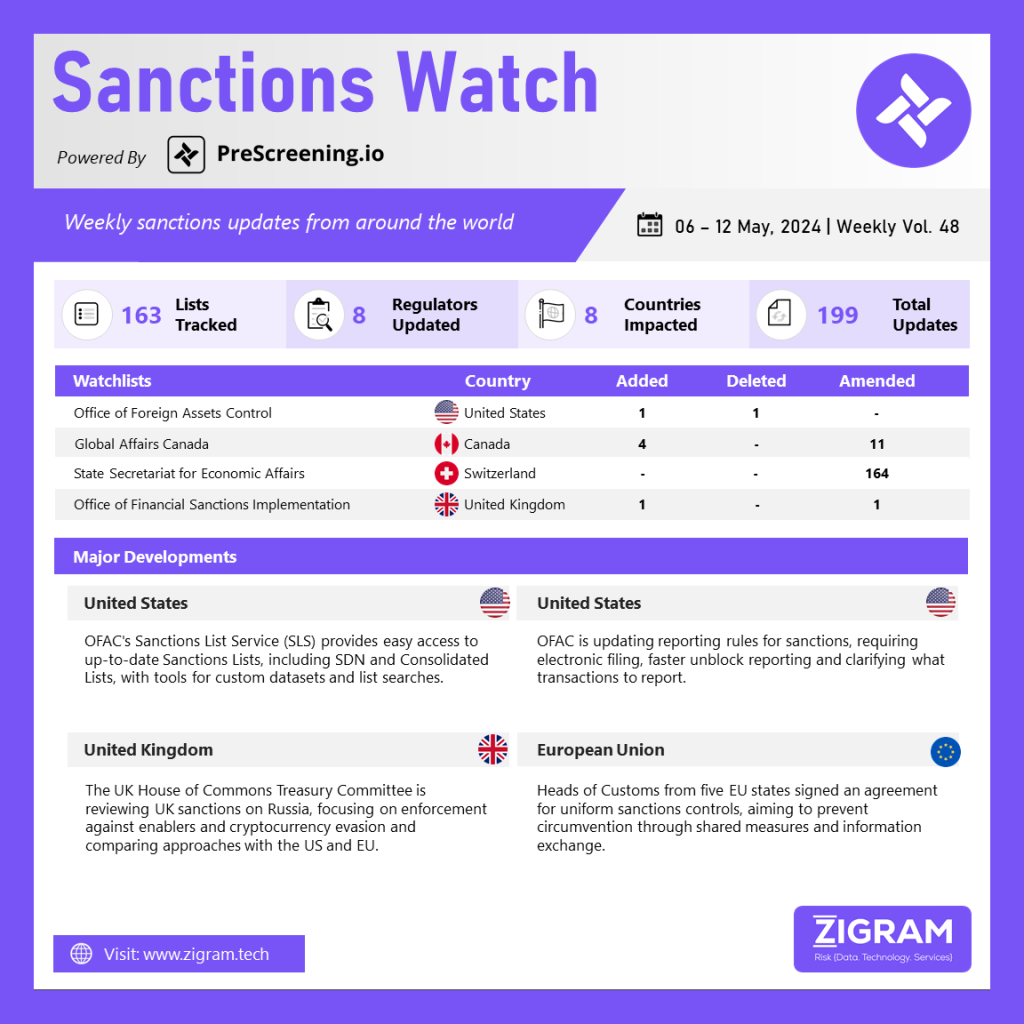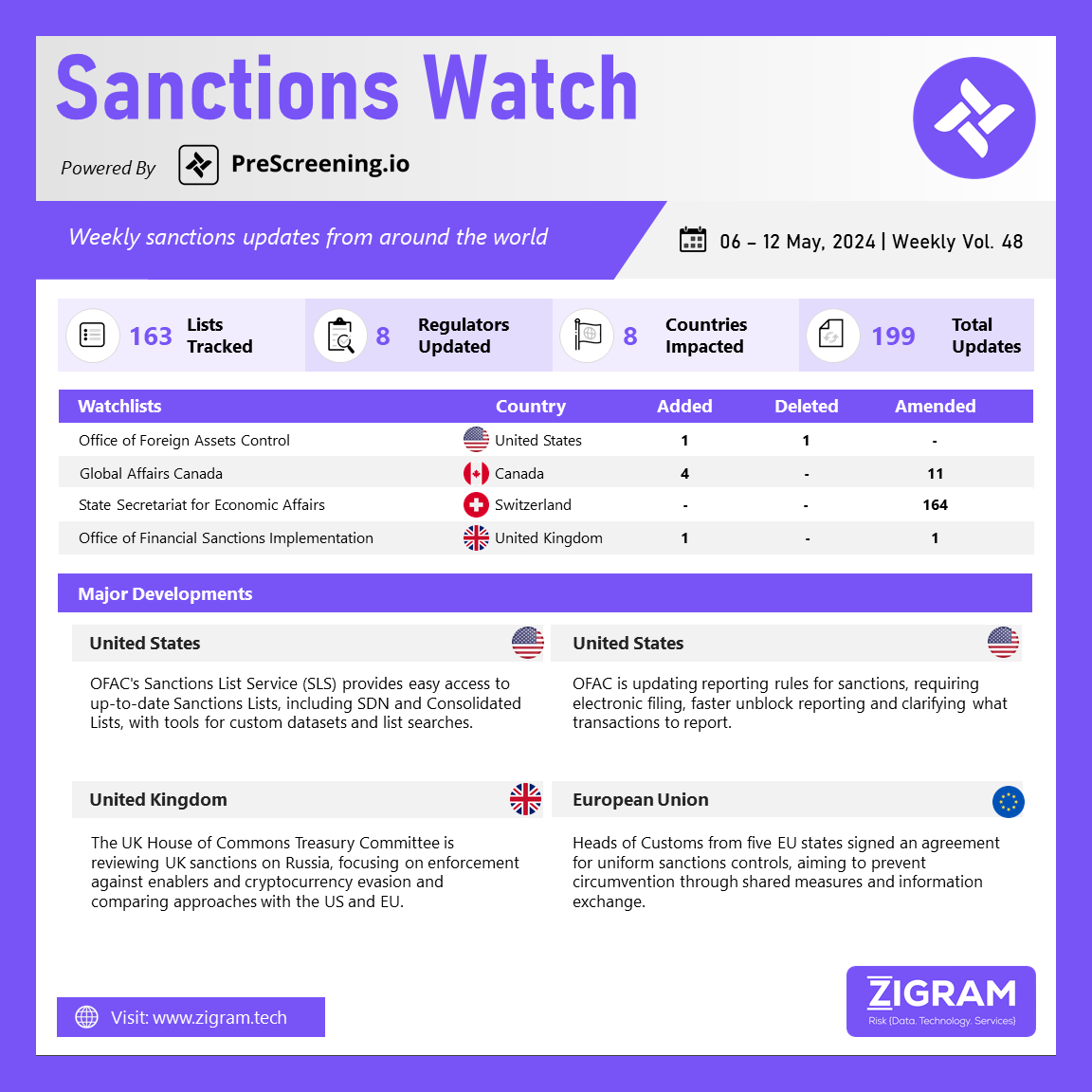Published Date:
In the latest edition of our Sanctions Watch weekly digest, we present significant updates on sanction watchlists and regulatory developments.
OFAC’s Sanctions List Service (SLS) offers convenient access to the latest Sanctions Lists and data for immediate download. Users can opt for the Specially Designated Nationals (SDN) List or the Consolidated (non-SDNs) List. An added feature is the Customize Sanctions Dataset tool, enabling users to create custom datasets from selected Sanctions lists and programs. Moreover, SLS now includes OFAC’s Sanctions List Search application, designed to simplify the use of the Specially Designated Nationals and Blocked Persons list (“SDN List”) and other Non-SDN lists under OFAC’s administration.
OFAC has issued an interim final rule proposing amendments to the Reporting, Procedures and Penalties Regulations, which outline standard reporting, record-keeping requirements and license applications under OFAC’s sanctions regimes. Written comments on the proposed amendments can be submitted through the Federal eRulemaking Portal or via mail to OFAC until 30 days after publication in the federal register (not yet published). The key proposals in the rule include removing the mail option for reports, requiring the reporting of blocked property that is unblocked or transferred within 10 business days, clarifying that reported “transactions” include those related to securities, checks, foreign exchange, sales, or purchases of goods or services, clarifying that if information required by OFAC is not readily available at the time a transaction is rejected, it is not mandatory to report that information and providing a point of contact for requests for general licenses.
The UK House of Commons Treasury Committee is conducting an inquiry to assess the effectiveness of the UK’s sanctions against Russia. Testimonies from experts like Tom Keatinge from RUSI, Ben Cowdock from Transparency International and Natalia Kubesch from Redress have highlighted various aspects. These include the sanctioning of “enablers” such as maritime insurers violating the oil price cap, the use of cryptocurrency to evade sanctions, the UK Government’s efforts to provide clearer guidance to banks for enforcing sanctions, the potential confiscation of Central Bank assets and a comparison of the UK’s approach with that of the US and EU. On May 14, 2024, the Committee is scheduled to hear from Bill Browder of Hermitage Capital, Emma Hardaker of Lloyds of London and Richard Bronze of Energy Aspects.
On May 9, 2024, the Heads of Customs authorities from five European Union Member States (Lithuania, Latvia, Estonia, Poland and Finland) signed an Agreement to enforce uniform controls for sanction implementation. Lithuania, recognized as a leader in mobilizing EU states to block Russian supply routes, proposed equally strict measures gaining support among Member States. Vice-Minister of Finance Rūta Bilkštytė emphasizes the importance of agreements between Customs authorities to strengthen sanction enforcement. The Baltic States initially approved a regional approach on January 26, expanding it today. Lithuanian Customs, enforcing stringent measures since 2023, sees reduced exports to Central Asia, proving efficacy. Despite EU sanctions, exports to Central Asia have risen, highlighting the need for broader enforcement. The signatory countries will enhance controls on restricted exports, requiring manufacturer declarations to mitigate circumvention risks. Director General Darius Žvironas welcomes Poland and Finland joining the initiative, foreseeing consistent practices among signatories to curb sanctions evasion.
- #OFAC
- #SpeciallyDesignatedNationals
- #SDNList
- #NonSDNList
- #Regulations
- #GeneralLicenses
- #UnitedKingdom
- #Russia
- #CustomsAuthorities
- #EuropeanUnionMemberStates
- #SanctionsWatch
- #RegulatoryCompliance
- #TradeCompliance
- #SanctionsEnforcement
- #SanctionsMonitoringBoard
- #RegulatoryObligations
- #SanctionsBreaches
- #Lithuania
- #ExportRestrictions


